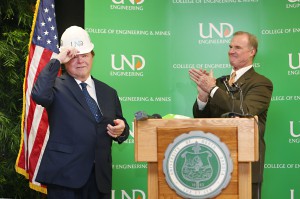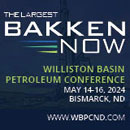
The University of North Dakota today announced $14 million in private and public partnership funding that will greatly enhance UND’s efforts in petroleum geology and related fields. The announcement also included the naming of the Harold Hamm School of Geology and Geological Engineering in the UND College of Engineering and Mines.
 The total project of $14,000,000 includes $10,000,000 provided as a gift from Harold Hamm and Continental Resources, Inc., which will create the Harold Hamm School of Geology and Geological Engineering. Another $4,000,000 from the Industrial Commission/Oil and Gas Research Program will fund the proposal entitled “Public-Private Partnership to Support Geology and Geological Engineering Education and Research at UND’s College of Engineering and Mines.”
The total project of $14,000,000 includes $10,000,000 provided as a gift from Harold Hamm and Continental Resources, Inc., which will create the Harold Hamm School of Geology and Geological Engineering. Another $4,000,000 from the Industrial Commission/Oil and Gas Research Program will fund the proposal entitled “Public-Private Partnership to Support Geology and Geological Engineering Education and Research at UND’s College of Engineering and Mines.”
“With the discovery of the world’s largest oil field in more than 40 years, Continental Resources and North Dakota are changing the world,” said Harold Hamm. “The Bakken Play is one of the primary fields making North American energy independence a reality, releasing us from the grip of foreign oil and serving as a model for unconventional oil production worldwide. Establishing the School of Geology and Geological Engineering is a vital commitment to continuing North Dakota’s national and global leadership in energy.”
North Dakota Governor Jack Dalrymple said, “We’re proud to be partnering with Harold Hamm and Continental Resources to provide funding through a private-public partnership for this major expansion of UND’s geology program. This is a perfect example of what can be done at our research institutions to enhance educational and employment opportunities for our state.”
UND President Robert Kelley said, “This is an exceptional day for the University of North Dakota. We are delighted to announce the naming of our School of Geology and Geological Engineering for Mr. Harold Hamm in honor of this very generous gift from Mr. Hamm and Continental Resources, Inc. This is the largest-ever gift to UND from someone who is not an alumnus of the University, and adds a significant dimension to North Dakota Spirit — The Campaign for UND.
“I also want to thank the North Dakota Industrial Commission for their very important portion of the private-public partnership,” said Kelley. “This is a perfect model of private dollars and public resources working together for maximum benefit. The combined funding will enhance the education of future petroleum geologists and engineers, which is key to the ongoing development of the Williston Basin and the nation’s petroleum resources.”
Said Hesham El-Rewini, dean of the UND College of Engineering and Mines, “As an essential part of the UND College of Engineering and Mines, the Harold Hamm School of Geology and Geological Engineering will highlight the importance of geology and geological engineering in the state, not only in terms of North Dakota’s financial well-being, but also in terms of employment within the state. The School will help attract high quality faculty members and the best and brightest students to North Dakota.”
“Our goal is to produce future generations of petroleum geologists and engineers who can contribute to building a better world through professional service and research for safe, reliable, and affordable energy production,” El-Rewini added. “We also aim to increase the research efforts currently conducted by faculty members and students in petroleum related fields, which will create new opportunities for collaboration with industry in North Dakota and elsewhere.”
“This generous funding will give students at the University of North Dakota access to technology and resources that will better prepare them for engineering and energy-related jobs here in North Dakota and around the world,” said Attorney General Wayne Stenehjem, a member of the North Dakota Industrial Commission. “It is our hope that this is only the beginning of what we can do, partnering with industry, to educate our future workforce.”
“We already have one of the best core libraries in the United States housed at the Wilson M. Laird Core Library on the UND campus. These dollars will help us leverage the information in that facility and improve the opportunities for students and others to better understand the geology of North Dakota’s natural resources,” said Agriculture Commissioner Doug Goehring, a member of the North Dakota Industrial Commission.
Gift from Harold Hamm and Continental Resources Inc.
The $10 million private gift from Harold Hamm and Continental Resources, Inc. will be made available over the next four years, and the endowment portion will continue to return funding on an ongoing basis. Designed to enhance education and research at the Harold Hamm School of Geology and Geological Engineering, the gift will have an impact on the entire College of Engineering and Mines for many years.
The gift has been designated as follows:
$3,750,000 – Endowed Professor of Petroleum Geology
$3,750,000 – Endowed Professor of Petroleum Engineering
$675,000 – Salary and benefits for the two Endowed Professor positions
$1,325,000 – Endowed Leadership Scholarships
$500,000 – Continental Resources High Resolution Virtual Core Library
Industrial Commission Oil and Gas Program Funding
The $4 million funding from the Industrial Commission Oil and Gas Research Program will be used as follows:
$1,500,000 – Equipment to establish Advanced Laboratories
$1,500,000 – Continental Resources High Resolution Virtual Core Library
$720,000 – Student scholarships and graduate assistantships
$280,000 – Students experience fund
–30–
Office of University Relations
Twamley Hall, Room 409
264 Centennial Drive, Stop 7144
Grand Forks, ND 58202-7144
Phone 701.777.2731
Fax 701.777.4616
UND.edu














